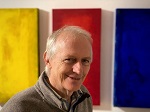Color from Pixels to Objects
Hosted By: Color Technical Group
02 November 2022 11:00 - 0:00
Eastern Time (US & Canada) (UTC -05:00)The study of color vision in humans has been a successful enterprise for more than 100 years. In particular, the establishment of colorimetry by the CIE in 1931 has brought forward tremendous advances in the study of color in business, science, and industry (Judd 1952). During the past 50 years, the processing of color information at the first stages of the visual system—in the cone photoreceptors and retinal ganglion cells—has been detailed at unprecedented levels of accuracy. Has color vision been solved?
In this webinar hosted by the Color Technical Group, Prof. Karl Gegenfurtner will argue that in order to transition from pixel color and flat, matte surfaces to the color distributions that characterize real-world, 3D objects in natural environments it is necessary to fully understand human color vision. Prof. Gegenfurtner will present results from Virtual Reality psychophysics and from Deep Neural Network modeling that show the importance of objects for color discrimination, color constancy and the emergence of color categories.
What You Will Learn:
- What we know about human color vision and what we still do not know
- Virtual Reality psychophysics
- Deep Neural Network modeling of human color vision
Who Should Attend:
- Students of human color vision
-
Professionals in academia and industry interested in human color vision perception
About the Presenter: Karl Gegenfurtner from Justus-Liebig-Universität
 Karl Gegenfurtner studied Psychology at Regensburg University. Suebsequently he obtained a Ph.D. degree from New York University, where he also spent his first PostDoc. In 1993 he moved to the Max-Planck-Institute for biological cybernetis in Tübingen, where he obtained his Habilitation in 1998 and a Heisenberg-Fellowship in the same year. In 2000 he moved to the University of Magdeburg and in 2001 to Giessen University, where he since then holds a full professorshipo for Psychology. The emphasis of his research is on information processing in the visual system. Specifically, he is concerned with the relationship between low level sensory processes, higher level visual cognition, and sensorimotor integration.
Karl Gegenfurtner studied Psychology at Regensburg University. Suebsequently he obtained a Ph.D. degree from New York University, where he also spent his first PostDoc. In 1993 he moved to the Max-Planck-Institute for biological cybernetis in Tübingen, where he obtained his Habilitation in 1998 and a Heisenberg-Fellowship in the same year. In 2000 he moved to the University of Magdeburg and in 2001 to Giessen University, where he since then holds a full professorshipo for Psychology. The emphasis of his research is on information processing in the visual system. Specifically, he is concerned with the relationship between low level sensory processes, higher level visual cognition, and sensorimotor integration.
